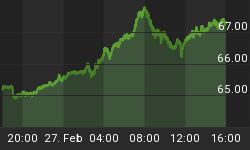It is astounding how many economists, government officials, and Wall Street strategists construe the current economic conditions as evidence of a bona fide recovery. It is a testament to the power of the rose colored glasses handed out by our nation's leading universities that such a feeling could be widely held despite the clear and present danger that compounds daily. The myopia leads us to enact policies that actually exacerbate our problems. The "remedies" are postponing, perhaps indefinitely, a true recovery.
The oracles who have described the nature of this imminent recovery do so based on their conviction that consumer spending is slowly returning to levels that existed prior to the recession. New data released today seems to support this view, with consumer spending up 0.5% in January.
However, missing from their analysis is any plausible explanation as to why consumers will be able to sustain such spending given the plunge in income and credit, and the lack of available savings. In fact, the same January spending report showed that personal income increased by only 0.1%, while the savings rate slowed to the smallest since 2008.
I would challenge those who fantasize about a consumer-led recovery to describe where the spending money will come from. Most consumers are tapped out, millions are unemployed, and home equity has been wiped out. The only reasonable thing for them to do is to pay down debt and sock away as much money as possible to rebuild their savings.
Beyond the question of "how" the spending could be achieved, is the deeper question of "why" such activity should be sought at all. Excessive spending, fueled by an insane housing bubble and catalyzed by reckless monetary and fiscal policy, was the reason that our current recession became unavoidable. Why would we want to go down that road again?
During the run up to the crash, excess spending had created economic distortions that have yet to be resolved. Too many resources, including land, labor, and capital, were devoted to servicing an unsustainable economic model in which Americans borrowed money to buy homes, products and services they really could not afford. In many cases consumer behavior was influenced by overly optimistic assumptions regarding real estate related riches.
However, now that the real estate bubble has burst, Americans are coming to terms with a more sober reality. Many have cut up their credit cards, dramatically reduced their spending, and have squirreled away as much money as they can. This change in behavior should necessitate a dramatic shift in the labor market as workers move away from jobs associated with consumer spending and toward jobs associated with real production, primarily for exportable goods.
The real problem is that monetary and fiscal policy designed to re-inflate the burst spending bubble is preventing this transition from taking place. As a result we are not creating the jobs we need to replace - the ones we have lost in mortgage servicing, home improvement, and real estate sales (which we never really needed to begin with). As these jobless remain unable to find alternative employment, our economy will continue to languish.
Some will argue that the new jobs created by government stimulus spending will provide the additional purchasing power necessary to revitalize consumer spending. There are two problems with this expectation. First, those jobs being "created" by the government are outnumbered by those being destroyed by government domination of resources. Second, even if it were possible for job growth to return, having hopefully learned from their mistakes, workers will be far more frugal with their paychecks than they were in the past.
Others hope that rising real estate prices will give consumers more confidence to spend. The reality is that housing prices are still too high and will likely fall further. But even if they did rise, consumers will still be reluctant to resume their shopping spree. Home equity extraction loans, which just a few years ago turned houses into ATMs, are now much harder to come by. When it comes to spending, it's not just about confidence; it's about cash.
The only possible way consumers can spend is if the government gives them the money. However, since the government cannot legitimately give money to one American without first taking it from another, the most likely means of doling out cash will be to run it off the printing presses.
That, in a nutshell, is our government's plan for economic recovery. Print a bunch of money and give it to consumers to spend. This is not a plan for recovery but a recipe for disaster. Those betting that this program can succeed in putting together a healthy and sustainable economy simply do not understand the nature of their wager. The smart money is going the other way.
For a more in-depth analysis of how the weaknesses in the U.S. economy could threaten dollar-based investments, subscribe to The Global Investor, Peter Schiff's free online newsletter. Click here for more information.















